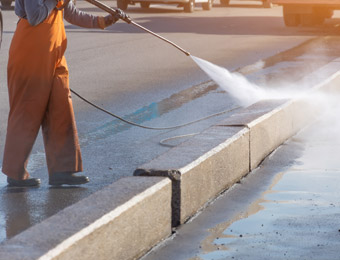Damaged pavement can be unsightly, decrease the value of your home, and be costly to repair. It’s critical to evaluate all possible solutions for fixing this type of damage. Repairs to your driveway can be expensive and complicated. It’s important to note that not every damage to your driveway may require a complete repair. You may be able to save time and money by repairing or resurfacing your driveway.
Understanding when to repair, resurface, or replace your asphalt will help you avoid overspending on unneeded services. Recognize the differences so you’ll know what services your driveway may require in the future.
When is the right time to repair your driveway?
The primary reason your driveway may require maintenance is due to physical damage, and asphalt is vulnerable to severe damage for various reasons. During the winter months, snowmelt and refreezing can cause cracks to form in your driveway. Given the hard winters our driveways endure, it’s most likely that they may crack over time. Cracking may wreak havoc on your driveway’s value and aesthetics.
However, do not worry; most of these little crevasses may be repaired with liquid crack-fillers. These fillers are intended for minor crack repairs that are not too deep, and it is critical to fix the crack soon before it becomes unrepairable. Driveway repairs are all that is required if your driveway has several tiny cracks. However, once the damage becomes too large, the plastic filling will fail to adequately seal it.
You may avoid this type of damage by patching cracks early and frequently. Although repairing a driveway may not have the same visual appeal as resurfacing, it is a simple and economical choice if the situation warrants it. Repairs are frequently required during resurfacing as well.
When is the right time to resurface your driveway?
If a simple repair is not sufficient, your driveway may require resurfacing. Resurfacing a driveway is a technique that involves adding extra layers of asphalt to your driveway, and the method completely transforms the appearance and top layer of your driveway.
The method of resurfacing your driveway is based on the extent of the repair. If your driveway has cracks and holes, they will reappear during resurfacing if the asphalt is not correctly fixed.
Resurfacing is an excellent alternative for homeowners who have tiny cracks in their driveway, as long as the foundation layer of asphalt remains structurally sound. Resurfacing your driveway will give it a whole new appearance without the expense of a total replacement.
While resurfacing is an excellent approach to achieve this new appearance for your driveway, if the construction of your driveway is not stable, the resurfacing efforts may cause more harm than good. It is critical to understand the long-term benefits of resurfacing versus replacement.
When is the right time to replace your driveway?
While resurfacing your driveway is an excellent option, it is not always the wisest course of action. After approximately 15 years, your driveway’s structural integrity will deteriorate and should be replaced. Similarly, if your driveway has an excessive number of cracks (1/3 of the total surface area), it may be more cost-effective to entirely replace the asphalt.
Repairs effectively fix cracks, but they are still costly if your driveway has sustained significant damage. It is crucial to evaluate the driveway’s long-term appearance and structural value. Naturally, asphalt will change appearance over time due to frequent use.
Choosing between resurfacing and replacing your driveway might be tough at times. If your driveway is only slightly damaged, a repair may be the best course of action. If you want to give your driveway a fresh look without replacing it entirely, a resurfacing job may be the answer. Replacement is the best option for ensuring the long-term viability of your driveway.

